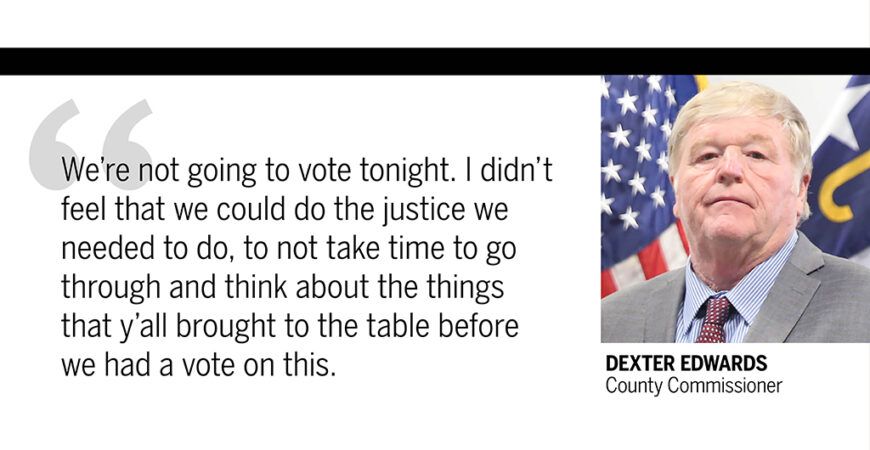The local health community opposes proposed merger
KENANSVILLE — The Board of County Commissioners held a public hearing on Dec. 2, during its scheduled bimonthly meeting to gather public comments about the proposed consolidation of the Duplin County Health Department and the Department of Social Services into a single entity.
County Manager Bryan Miller recommended the consolidation, emphasizing that it presents an opportunity to create a more comprehensive care model and streamline processes, which could ultimately enhance services for residents.
The new department will be named the Department of Health and Human Services. Miller explained that this consolidation will ensure the continuity of services. If approved, the Board of County Commissioners would take on the responsibilities and functions of both the Department of Social Services Board and the Board of Health, and employees from both departments would transition to the county’s personnel policy.
“Four of the six counties bordering Duplin County have chosen the same method and approach recommended tonight,” said Miller, adding that out of 33 counties that have consolidated, 15 counties have chosen to have the board of commissioners assume those powers and duties.
Miller clarified that this initiative is not aimed at cutting positions, and assured that the Employee Health Clinic will remain open.
“No one is losing their jobs. Any reduction enforced will be through attrition, retirement, resignation,” said Miller. “This is not an attempt to gain the authority to terminate the employment of either the health director or the DSS director, and let me be clear about this — no other programs or areas within these departments are subject to termination due to the consolidation.”
The county manager also emphasized that it was an opportunity to gain better data and align policy through both departments to address the social determinants of health.
“This is also an opportunity to bring all employees under one personnel policy and an opportunity to gain better financial internal controls over the organization as a whole,” said Miller. “It all comes down to those that we serve and how we can do that in a manner that aligns with policy, is fiscally responsible and most importantly promotes positive outcomes.”
The comments poured in as soon as Chairman Dexter Edwards opened the floor for discussion.
Local physicians, nurses, members of the Board of Health, advocates and personnel from the Health Department each expressed their concerns. In total, 10 individuals spoke out against the proposal for consolidation.
Alleen Carr-Greer, Duplin County Board of Health chair, voiced concerns regarding the lack of analyses to support claims of enhanced efficiency. She highlighted the board’s critical need to carefully select a new director for the merged agency, stressing the importance of finding a leader capable of managing both agencies effectively, each with its unique regulatory framework, and adding that their decision will significantly impact the future of the county’s health services.
Carr-Greer asked the board to consider the impact of consolidating the agencies; she expressed particular concern about potential disruptions and noted that managing the responsibilities of a Board of Health was time-sensitive, particularly during an outbreak of infectious illness.
“Efforts to mitigate the spread of infectious disease can quickly become polarizing,” said Carr-Greer, adding that other pressing matters—such as sewage spills, lead contamination, and restaurant sanitation—demand immediate attention.
She raised concerns about whether the board of county commissioners will be able to address all these additional tasks alongside their existing duties and concluded asserting that the public health mission is best accomplished with a standalone health department.
Beth Ricci, the health department’s accreditation coordinator, expressed concern about maintaining state accreditation if the board of county commissioners assumed the powers of the Board of Health or appointed a consolidated advisory committee.
“The governing board will be responsible to meet all the rules and laws, including the accreditation requirements assigned to the Board of Health regardless of the type of governing board,” said Ricci. “Not meeting accreditation standards could potentially risk the loss of state and federal funds the health department needs to provide the essential services to the county’s communities.”
Ila Davis, former health director, pointed out that the missions of these agencies are very different and shared that she has observed that consolidations are more complex than they appear on paper. She noted that although some clients may overlap, the services provided differ significantly. Davis urged the board to carefully consider their decision before making a change.
Regina Lanier, who worked as a nurse for 30 years, encouraged discussion.
“There also exists a larger opportunity for regional or district consolidation if we’re talking about this in an overarching manner. The state allows for us to create a district health service,” said Lanier, asking if there has been a conversation about Region 8. She also questioned if the consolidated agency will have a prospective advantage of increased accountability to elected officials and if they have considered outsource a firm to help assess the status of both agencies.
Dr. Andrew Justice, medical director of the Health Department, noted that they are providing more services than they ever have before. He explained that preventing disease and promoting health in Duplin County is very different than other areas.
“We have agricultural issues here that you won’t find in many other places with a lot of resources. We have a lot of immigrant issues here as well,” said Justice.
“We are providing preventative medications for HIV; we are providing hepatitis C treatment, from workup with labs to full treatment courses of $40,000 — all free to patients,” said Justice. “We’re seeing immigrants and a lot [more] diseases in people than we’ve ever seen.”
Justice voiced concerns that efficiency will slow down with a consolidation.
“Public health, in a nutshell, offers an incredible insight into our society, how we’re doing things, and how healthy we are in general. When I think about public health, what I always want to know is do our political choices create gaps in health outcomes or do they narrow them? And that’s one of the big things to think about with this decision. Are we going to leave people behind or are we going to uplift the overall health standards of our county? I hope you guys think about all of these things because this is a big decision, and the health of a lot of people could be affected by it.”
Yesenia Cuello, executive director of NC FIELD and member of the Governor’s Advisory Council on Hispanic and Latino Affairs, shared that a consolidated system risks creating more barriers for the nearly 25% of the county’s residents who are Hispanic.
“Consolidating health and social services creates more red tape, making it harder for the elderly, uninsured, and non-English speakers to get help. It delays care, adds confusion, and hurts the county’s most vulnerable. While it may save money, it risks lives by putting barriers between people and the help they need,” said Cuello.
She added that agriculture workers in Duplin depend on health care services that are culturally and linguistically accessible to maintain their health and productivity and if those services become less accessible, it could negatively affect both the workers and the overall economic stability of the county.
“Duplin County Health Department’s model understands this better than any other county office. Although this benefits the county, it doesn’t necessarily benefit the community. We’ve been able to look, and we’ve done our research, and it shows that these findings suggest that while consolidation aims to streamline services, it can inadvertently create more barriers to effective public health interventions, especially for the most vulnerable community members,” said Cuello.
Craig Westerby, a member of the Health Board, urged the board to consider whether this change truly benefits the citizens, noting that no amount of efficiency can compensate for citizens’ needs not being met.
Lisa Meredith, a nurse practitioner at the Health Department, highlighted that services in health departments that have been consolidated are often diminished. She also praised how effectively the department operated to support the community during the pandemic and noted the current efficiency under the director’s leadership.
“When COVID hit our county, there was a lot of organization behind the scenes that our public health people worked day and night,” said Meredith. “We didn’t get to go hide. We were out there taking care of patients and trying to save lives and I think it was a well-oiled machine.”
Chad Kornegay, chief of the medical staff at ECU Health Duplin, told the board that he expected the county to have someone with a background in public health that could substantiate the proposed change.
“You’ve heard from the current medical director of the health department. You’ve heard the opinion of the Board of Health and although there may be advantages to this, we do not believe at this time this is the way to go for Duplin County,” said Kornegay. “We think that the mission of the Board of Health is very essential to what we do every day and we think that the way things are set up now meets that mission the best.”
Gabby Murphy, a local nurse who works with tuberculosis and communicable diseases, emphasized the importance of having an effective leader, like the current health director, to efficiently coordinate a rapid response when dealing with communicable diseases. She mentioned that the influx of immigrants has led to a significant rise in TB cases, and they recently identified a handful of cases.
Murphy also highlighted a recent incident involving a man from another county, which necessitated testing about 70 people for TB in November. Murphy said this testing was completed in just one day, adding that it’s crucial to act quickly to control this type of situation.
Edwards thanked everyone and acknowledged the huge role the health department played during the pandemic. He also noted that they will consider the concerns and vote at the Dec. 16 meeting.
“Thank you for your care and concern, and time tonight. I will tell you we’re not going to vote tonight. I didn’t feel that we could do the justice we needed to do, to not take time to go through and think about the things that y’all brought to the table before we had a vote on this, positive or negative.”
 Twitter
Twitter Facebook
Facebook Instagram
Instagram





